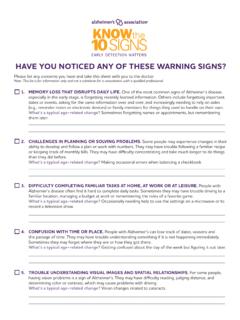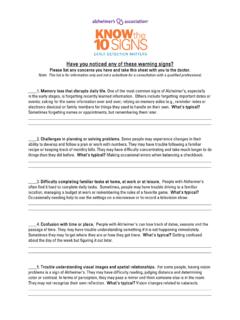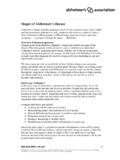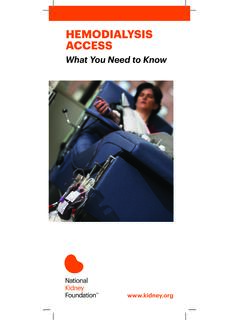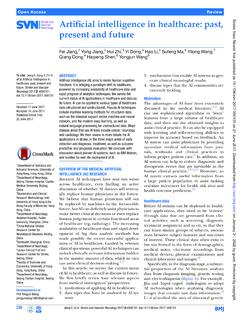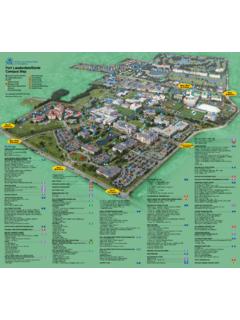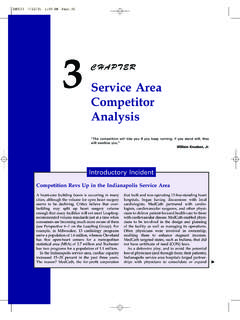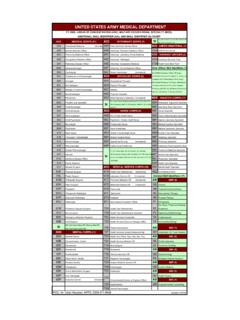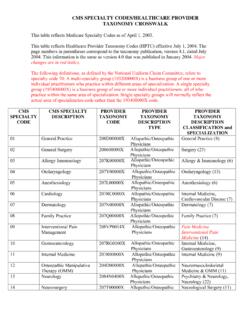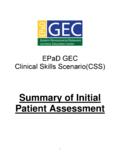Transcription of Choosing a doctor to evaluate memory and thinking problems
1 | 2017 Alzheimer s Association . All rights reserved. This is an official publication of the Alzheimer s Association but may be distributed by unaffiliated organizations and individuals. Such distribution does not constitute an endorsement of these parties or their activities by the Alzheimer s Association. 1 Choosing a doctor to evaluate memory and thinking problems While many people experience some changes in their memory as they age, memory loss and thinking problems that disrupt daily life are not a typical part of aging.
2 If you or someone you know is experiencing memory or thinking problems , it is important to share these concerns with your doctor . Only a full medical evaluation conducted by a licensed physician can determine if your symptoms are related to dementia. About dementia Dementia is not a specific disease, but a range of symptoms associated with memory or thinking problems severe enough to affect a person s ability to perform everyday activities. Consulting a doctor at an early stage is critical to allow for treatment and planning.
3 If you have dementia, it s important to find out what type it is because treatments and symptoms can vary. The four most common types of dementia are: Alzheimer s disease. vascular dementia. Dementia with Lewy bodies. Frontotemporal dementia. Types of doctors who evaluate memory and thinking problems Primary care physicians People often first discuss their memory or thinking concerns with their primary care physician, sometimes referred to as a generalist. Trained in general internal medicine or family medicine, primary care physicians focus on diagnosing and treating common medical conditions.
4 Many primary care physicians perform an initial assessment and full evaluation, but may also refer patients to a specialist to confirm the diagnosis and determine the type of dementia. When talking to your primary care physician about your memory and thinking problems , ask how familiar he or she is with diagnosing dementia and whether there are circumstances in which he or she would refer to a specialist. Specialists The specialists listed below can evaluate memory and thinking issues and diagnose dementia.
5 Some people with unclear symptoms, including those under age 65, may require evaluation by two or more specialists who combine their findings to reach a diagnosis. Geriatricians are primary care physicians who have additional training in geriatrics (medical care for diseases and conditions common among older adults, generally over age 65). These physicians are typically prepared to manage multiple medical conditions. | 2017 Alzheimer s Association . All rights reserved. This is an official publication of the Alzheimer s Association but may be distributed by unaffiliated organizations and individuals.
6 Such distribution does not constitute an endorsement of these parties or their activities by the Alzheimer s Association. 2 Geriatric Psychiatrists are trained in general psychiatry with additional training in mental health and aging. They may be helpful in ruling out other causes of memory loss, such as depression, and in treating behavioral issues in people with dementia. Neurologists are trained in nervous system disorders, including issues with the brain, spinal cord and peripheral nerves.
7 Neurologists typically receive formal training in Alzheimer s disease and other dementias, although not all diagnose or treat people with the disease. Some neurologists focus on other conditions, such as pain management, Parkinson s disease and seizure disorders. If you are referred to a neurologist, inquire if they treat patients with Alzheimer s or other dementias. Neuropsychologists a dminister a variety of tests to assess thinking abilities, including memory , attention, language, reading and problem-solving skills.
8 Neuropsychologists work closely with other specialists and primary care physicians during the diagnostic process. Most practicing clinical neuropsychologists have an advanced degree ( or .) in clinical psychology and additional training in neuropsychology. Dementia diagnostic centers, Alzheimer s Disease Centers (ADCs) and Alzheimer s Disease Research Centers (ADRCs) generally have at least two types of specialists as part of their medical team who can diagnose and treat dementia. ADCs and ADRCs are funded by the National Institute on Aging (NIA).
9 ADRCs and some dementia diagnostic centers are involved in research and can suggest ways to participate in clinical studies. The diagnostic process Your doctor may request multiple tests in order to evaluate your memory concerns so that the cause can be accurately determined. The evaluation may be divided up into several visits, giving your doctor (s) enough time to determine the cause of your memory changes and rule out others. In situations where the cause of memory loss is more evident, fewer tests may be needed.
10 The steps in a memory evaluation may include: A medical history includes your current and past medical problems and concerns, current and past medications, family medical history and diet, including alcohol use. In addition to speaking with you, your doctor may ask to speak with family members or others who know you well to determine if they have noticed any changes in your memory or thinking . A p hysical exam involves assessing your blood pressure, temperature and pulse, as well as other procedures to evaluate your overall health.



